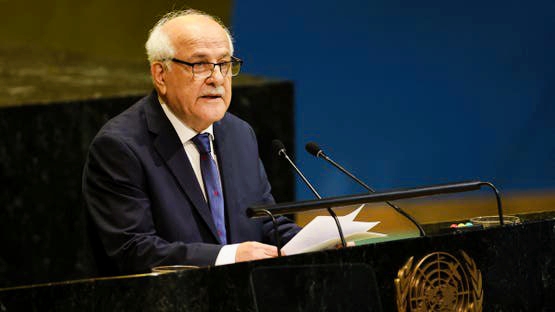Palestine's representative to the United Nations, Riyad Mansour, confirmed yesterday, Tuesday, that the international "Two-State Solution" conference, chaired by the Kingdom of Saudi Arabia in partnership with France, marked a historic turning point in the peace process and established irreversible foundations for resolving the Palestinian issue.
Mansour said: "The conference sent a clear message to the world that an alternative to war exists, which is peace based on justice and international legitimacy."
Mansour's statements coincided with the Saudi Cabinet's praise during its session held in the city of Neom, chaired by Crown Prince Mohammed bin Salman, for the results of the conference, where the council described the final document of the conference as an "integrated and actionable framework" for implementing the two-state solution, achieving regional and international security and stability, and contributing to building a prosperous future for the peoples of the region.
The Saudi Cabinet called on all member states of the United Nations to support the final document, emphasizing that the increasing recognition of the Palestinian state by several countries represents a "historic step" and a "manifestation of international legitimacy and explicit support for peace."
The "Two-State Solution" conference was held last week in New York with wide participation from countries around the world, resulting in unprecedented international consensus that the establishment of an independent Palestinian state is the only way to achieve just and lasting peace in the Middle East.
Participants confirmed the necessity of taking concrete steps linked to a clear and irreversible timeline for implementing the solution.
The conference also witnessed direct dialogue with several European and Asian countries to urge them to officially recognize the State of Palestine.
France renewed its commitment to announce recognition of the Palestinian state in September, while the United Kingdom, Portugal, Malta, and Canada announced their intention to recognize Palestine soon.
The conference represents a qualitative leap in international efforts to revive the peace process and reflects the increasing shift in international positions in favor of embodying the two-state solution on the ground, ensuring the rights of the Palestinian people to establish their independent state on the 1967 borders with East Jerusalem as its capital.

